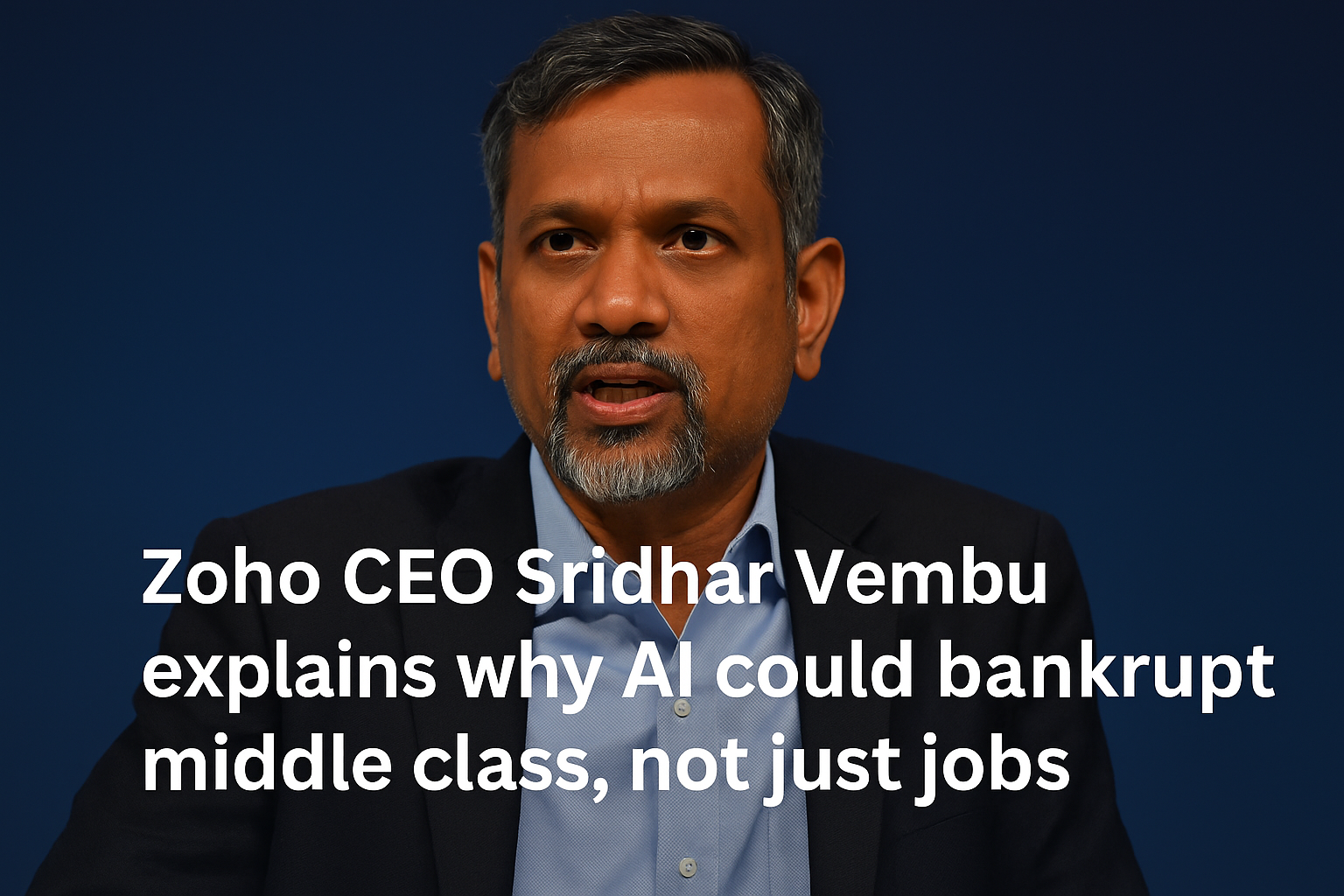Zoho CEO Sridhar Vembu : Artificial intelligence is rapidly transforming the IT industry. From automating tasks to reshaping business structures, this technology has the potential to bring new benefits. However, not everyone sees AI as being entirely beneficial. One of the most vocal critics of AI expansion is Sridhar vambu, CEO and co-founder of Indian tech giant Juhu. In a public statement that went viral recently, Bambu expressed deep concern about the economic impact of AI. His words were not just focused on job losses, a commonly discussed rate, but more worryingly, the risk of bankruptcy for the middle class. Find out why Sridhar Vambu thinks this matters and how AI could reshape the basic economic class system.
Zoho Ceo What Did Sridhar Vembu Say?
CEO Sridhar said on a public forum that a complaint has been made by the government, about which he believes it is being ignored. He said that we have heard that if the company is being stripped then this is the beginning of the biggest crisis, that is the capacity of the company can be completely lost, if this happens then we will not only sell the company on a large scale but also take away the value from the skilled workers, a large part of its work force will become financially inadequate.
Why Is AI a Threat to the Middle Class?
Traditionally, the middle class, which includes skilled workers, teachers, IT professionals and small business owners, has thrived on steady, single-enterprise growth, but with the white minority able to do large-scale work, this gap is at risk.
Here’s how AI disrupts this system:
Here’s how this organism Hinders employment, now people can accomplish more with less, a driven health trait means it’s easier to get in and do work, even in demanding jobs.
Lower Wages for Creative Work: Low Pay for Enterprise Chat Gupta Tools like DL and Mid Journey are capable of designing emails and even creating code As these tools get more powerful the demand for enterprise is increasing at the entry and mid level.
Software Replaces Services: Account Customer Service Agent Writer Translator Speech to Text Text to Speak Text to Video Some Legal Professionals Are Already Singing Their Rules and Shrinking I Can Offer the Service at Near Zero Marginal Cost This is a Very Disturbed Skilled Person
Winner-Takes-All Effect: The best AI-powered platforms dominate the market and it is becoming difficult for small businesses and freelancers to replace them. It is not just about job replacement, it is AI suppression and this is what Bamboo is warning all citizens against.
The Emerging Risk: Income Erosion, Not Just Job Loss
According to Vembu, the real danger of AI is how it undermines human contributions. When AI systems can do 80% of the work at 10% of the cost, companies will start paying a lot less for human input — even if they still hire people. This shift could lead to: Stagnant wages in skilled fields Decreased job mobility An ageing reliance on gig or freelance work A shrinking tax base, as fewer people earn enough to be taxed If the middle class loses its ability to earn and spend, it impacts everything from housing markets to healthcare systems. That’s when a tech revolution turns into a social and financial crisis.
Can the Middle Class Be Protected?
Yes, but only with proactive policies and strategic planning. Vembu and other experts recommend the following steps:
Re-skill and Up-skill Fast
Governments and companies must invest in training for high-demand roles that can’t be automated easily — such as emotional intelligence, strategy, leadership, and advanced AI development.
2. Develop Ethical AI
Promote decentralized and inclusive AI platforms that serve small businesses, rural users, and non-English speakers.
3. Taxation and Redistribution
Explore new tax models such as AI income tax, robot taxes, or wealth taxes on tech firms to redistribute AI-generated profits to citizens.
4. Strengthen Local Economies
Support small businesses and creators who can use AI to scale their work, rather than be replaced by it.
5. Promote Digital Sovereignty
Invest in local infrastructure, languages, and tools so that developing nations are not just consumers of foreign AI platforms.
Final Thoughts: A Wake-Up Call, Not a Death Sentence
Sridhar Vembu’s remarks should not be dismissed as anti-tech fear-mongering. He runs Zoho — a global tech company that uses AI itself. His concern is not about the technology, but about its distribution and ethics AI will reshape the future — that much is certain. But without thoughtful policy, broad-based education, and ethical implementation, it could also hollow out the middle class, leading to deep economic instability.
ALSO READ How to Earn Money Online at Home in 2025: Top Proven Methods for Beginners and Experts




